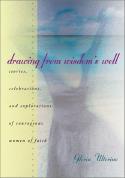Issue Date: October 10, 2003
Author brings to life wisdom learned from lives of biblical women, mystics, Argentinean mothers Reviewed by GAIL A. RICCIUTI Gloria Ulterino, an active Roman Catholic laywoman, has conducted an artful ministry of storytelling and liturgy for parishes, retreat settings and faith groups since 1998. From her popular work in the ecumenical community has come a wonderful volume, both scholarly and graceful. With evocative illustrations by Jane Pitz, Drawing from Wisdom’s Well is really three books in one, containing exquisite liturgies, well-researched biblical study, and reflections that lead worshipers to deeper spiritual insights illumined through the lives of foremothers in faith. The collection of 13 worship celebrations incorporates first-person monologues as the Liturgy of the Word; participatory rituals to elicit and enable worshipers’ response; clear instructions for creating each worship environment; and beautifully integrated musical resources. Ulterino’s biblical and historical background work is extensively footnoted; and she supplies a bibliographic list with each chapter, representing a selection of the most up-to-date resources on its focal theme and character. Her celebrations focus upon intriguing and courageous biblical women, among them Sarah and Hagar, the daughters of Zelophehad, Prisca (along with her sisters in ministry), and Mary Magdalene, as well as three unnamed women of the gospels. The volume also includes chapters featuring Hildegard of Bingen, Julian of Norwich, and the Madres of the Plaza de Mayo in Argentina. Across distance and time, their stories become new and their courage engages the reader through the author’s thorough research and creative imagination. At the same time, Ulterino does not simply acquiesce to age-old understandings, but asks probing questions of the traditional interpretations regarding these women’s lives and leadership. The dedication page, inscribed simply “To the women,” hints at the genius and insight of the author’s approach: She has obviously come to know these foremothers as intimately as if she had been able to crawl inside their skin. An accomplished scholar and lay preacher with master’s degrees in divinity, theology and recent American history, Ulterino brings together solid and provocative scholarship with artful liturgical imagination. It is always beneficial when the language of worship is expanded and invigorated through liturgical artistry, and transformative new rituals are offered that strengthen and complement the best of ancient tradition. This collection achieves both objectives. The author’s poetic use of language and her excellent scholarship are evident, for example, in Chapter 8 in the Call to Worship for a service centered on the biblical Martha, sister of Mary and Lazarus: Leader: My tongue was all bound up, The author’s graceful and intriguing use of the phrase “into Christ” is footnoted with the explanation that John’s Gospel uses a construction 36 times not found elsewhere in Greek literature, literally meaning “to believe into” -- implying the profound knowing of a lover or a close friend. It is such depth of scholarly insight that makes these celebrations reverberate with life. The liturgy commemorating the Madres of the Plaza de Mayo, the group of Argentinean mothers who protested their government’s kidnapping of their children and husbands, incorporates a “Ritual of Walking the Path of Prophetic Wisdom” in which each participant is provided with a white cloth square and, after a silent blessing, is invited to put on this “shawl.” Participants then walk around silently counterclockwise, two by two, each carrying a written statement of her own truth “born out of the searing experience of our lives.” Indeed, the ritual components of Ulterino’s work routinely incorporate a blessing or anointing, all without exception offered with a reverence that enables participants to minister to one another. The services are readily accessible and adaptable to specific congregational prayer group, retreat or conference contexts: The monologues, for example, can be learned and acted in costume as dramatic pieces (much the way the author herself does in her storytelling ministry) or presented as dramatic readings. A study group might even plan a year of Bible studies using Ulterino’s comprehensive research as a guide, accompanied by the companion liturgies. The “stories, celebrations and explorations” of Drawing from Wisdom’s Well will also be useful to women (and indeed to men) of faith for individual spiritual reflection. Drawing from Wisdom’s Well should be on the shelves of all who strive for a lively faith community, lead worship, work for justice, or simply seek the spiritual courage of saints who came before us. It is the kind of book that is sure to become a treasured reference and resource, offering a stirring vision of the synergy that arises from the meeting of faithful scholarship and an imaginative response to the Word. Gail A. Ricciuti is associate professor of homiletics at Colgate Rochester Crozer Divinity School in Rochester, N.Y. She is an ordained minister in the Presbyterian Church (USA) and is co-author, with Rosemary C. Mitchell, of Birthings and Blessings: Liberating Worship Services for the Inclusive Church (two volumes). National Catholic Reporter, October 10, 2003 |
